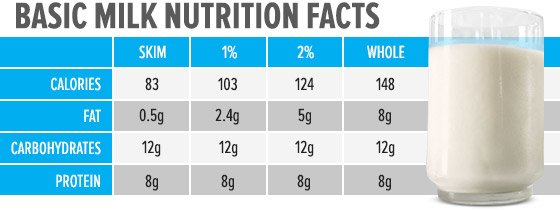Do you ever feel like no matter how much you lift and how much you eat, the scale just doesn't tip the way you would like for it to? Many supplements have been discussed over and over again in every single Flex, Muscle & Fitness and Muscular Development we read, many of which have been proven to be effective most of the time.
The two supplements that seem to stand out most consistently as tried-and-true are creatine monohydrate and protein. Whether you are trying to simply maintain health or be in the best shape of your life, we are all taught from an early age that protein is the most important thing for your body other than water.
Adding Milk To Your Diet
This article is geared towards hardgainers who have tried everything (including creatine) and still can't manage to get the scale to where they want it. A method which has been tried-and-true by yours truly is the incorporation of milk into your diet, and I mean in a big way.
Starting at one 155 pounds and doing everything I could to put on even a small amount of weight, milk was the single most important tool in getting my weight up to 180 in a timeframe of three to four months. This of course came along with hard work and dedication in the gym as well as eating at least a fairly healthy diet along with the introduction of milk.

I am here to tell you that it is possible to achieve the body you want, and to get you one step closer to doing what has seemed impossible for so long. Do you want to drink your way to a bigger body? If so, then read on.
It is often recommended that when attempting to gain weight, one should aim to take in one gram of protein per pound of bodyweight. From a financial standpoint as well as physically, this can be very difficult to some, especially those who just can't seem to eat enough to reach this high number of daily calories. After all, if gaining weight were easy you would not be reading this article!
Whole milk has 150 calories per one cup or serving (8 oz) and eight grams of protein. Along with this comes the disturbing fact that there are also eight grams of fat in just one cup of whole milk, but this is usually not a concern for a hardgainer since we take weight however we can get it by means such as dirty bulking.
If this concerns you, skim milk, contains only 86 calories and 0.5 grams of fat while still maintaining the eight grams of protein per serving. Skim milk is a great alternative since it contains the same amount of protein as whole milk. With that being said, there is no reason anybody should not be drinking milk at least as part of their diet.
As a hardgainer, especially during a bulking phase, I always reach for the whole milk and drink up, on many occasions drinking as much as one gallon per day!
One gallon of whole milk has 2600 calories in it, which can be a more than substantial addition of calories to those that you had to shove down your throat throughout the day. Imagine taking that many calories and just tacking it onto what you already eat on a daily basis. You will be gaining weight in no time!
Getting In Enough Calories
There is a caloric number that you must reach each day in order to grow, and this number should be the intake of the average person weighing what you would like to weigh.
A valuable piece of information that I have kept with me is that if you want to weigh 180 pounds, then you must eat like a 180-pound person.
According to one online calculator, it was projected that to maintain a weight of 180 pounds, a 22-year-old male must consume around 2700 calories a day.
Let's say that this is your goal and no matter what you do and no matter how much you eat, you get stuffed throughout the day and can only tolerate 1750-2000 calories in one day, which is the problem I was constantly faced with.
You count your calories, (which is always crucial) and determine that you need to drink what you can't eat—around 950 additional calories.
If you do the calculations, this comes out to three to four 16-ounce glasses (6-8 servings) of milk a day, which is a very attainable goal. The method is to eat as much as you can at each meal. When you can't go on eating, let the milk flow, since most people can still drink even after they are full.
I found myself drinking milk with every meal to add on additional calories, and in many cases when I didn't have time to eat I drank glasses of milk to have something in my body instead.
Drinking Milk Before Sleep
Another milk-drinking strategy is to drink milk close to bedtime as well so you have a protein source throughout the night on top of what is hopefully your bedtime snack.
It is very crucial, hardgainer or not, to take a substantial protein source before bed as a supply for your body to use throughout the night. For (hopefully) eight hours, you will have no means of food or drink to help you repair from your workout.
If a person is getting the sleep that they should, then one should know that it would not be ideal to go that long without food if your primary goal is to gain weight. The protein found in milk is called casein protein, which is slow to absorb and will therefore last longer within the body.

As a hardgainer you never want your body to be starving for protein; it should be like a machine always running on protein as its fuel. An excellent way to help overcome this problem throughout the night is drinking milk before going to bed.
In my bulking phase I typically drink one or two 16-ounce glasses of milk along with four tablespoons of peanut butter right before bed. This ensures that my body will have protein throughout the entire night and I will be able to regenerate and grow to my fullest potential, even in my sleep.
Conclusion
For those of you who thought that gaining weight was impossible to do, this information can be eye-opening. We read so much about these scientific findings, which do nothing for some but complicate things even further and make the hill seem that much steeper.
